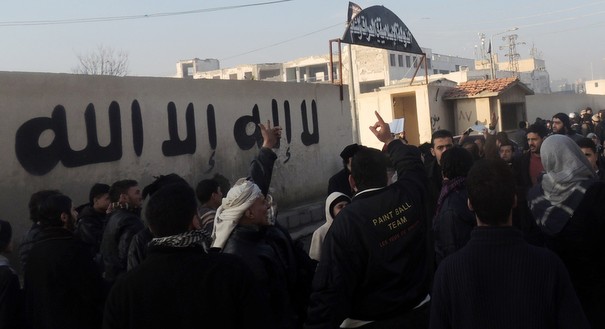On January 7, during the worst infighting between Syrian rebel groups to date, the head of the al-Qaeda–aligned Nusra Front, Abu Mohammad al-Golani, proposed that the rebels use an Islamic court to negotiate their differences. Calling for a ceasefire between rebel groups, Golani said the current infighting was the result of “incorrect policies” by the rival jihadi faction known as the Islamic State of Iraq and the Levant (ISIL).
Golani’s statements echo other fighters’ complaints about the ISIL. As an official from an Islamist-led rebel coalition called the Islamic Front recently told Al Jazeera, the ISIL insists on “acting as a ‘state’ rather than one faction among others” and will “not submit to conflict resolution through impartial sharia tribunals like others do.” Another noted on Twitter: “We do not accept that the jihad is reduced to one single faction, just as we do not accept that any faction names itself a state.”
While the Nusra Front is designated a terrorist group by the United States and others, its members are seen by some Syrians as “fair arbiters when dealing with corruption and social services.” Young and entrepreneurial, the Nusra Front is distinguishing itself among jihadis in pushing both for a coalitionist approach to the Syrian power vacuum and for a deceptive gradualism in enforcing strict Islamic legal, or sharia, norms over time—thereby also building a postconflict template for Syria.
The ISIL’s heavy-handed approach and claims of statehood have polarized rebels and put off local Syrians. This has given the Nusra Front a chance to redirect the conflict away from the building of an Islamic state to a more flexible approach that views the question of political order from a normative perspective. Instead of focusing on the institutions of a future Syria, the Nusra Front is trying to implement a more broadly based Islamic rule of law.
Broad Legitimacy for Sharia Principles
Our own research indicates that although Golani’s pragmatic proposal for a sharia court to handle disputes may seem far-fetched or extreme to many in the West, it’s neither unrealistic nor unprecedented. After all, employing sharia law in constitutions and state penal codes is a norm shared across many Muslim states. Even if aspirational, there is something telling—in terms of political culture and identity—about the desire of Muslim governments and groups to embed sharia norms in basic laws or operating practices.
Jihadi factions in a war-zone setting will often make effective use of sharia, both as a conflict resolution tool and as a template for a new political system, drawing on the broad support in society for what are perceived as genuine Islamic values. Where governance remains poor or nonexistent, support for strict sharia may therefore be robust, both as a means for enforcing ethical conduct and public order and as a reflection of widespread popular aspirations for an idealized Islamic law.
In practice, of course, jihadi fighters will often selectively choose their battlefield rules, frequently distorting so-called hudoud crimes (or crimes that are specified in the Quran) without also using the accompanying stringent Islamic rules of proof and evidence, all while eschewing Islamic humanitarian norms that offer some of the world’s earliest protections for noncombatants (such as Quran 5:32).
In 2012, the Mali-based jihadi group Ansar Dine and al-Qaeda in the Islamic Maghreb (AQIM) instituted a repressive interpretation of sharia in northern Mali that included executions and amputations. As a matter of strategy, Islamists had helped local Tuareg rebels seize power, then turned on them to capture the north. This strategy was both typical and telling: their goal was not primarily to achieve independence, the aim of the Tuareg nationalists, but to impose sharia on Mali.
Now, a similar situation is brewing in Syria. The Nusra-backed Sharia Authority operates an Islamic court out of an old hospital in Aleppo, doling out sentences like 40 lashes with a metal pipe for drug abuse. While this is not state building per se, it is certainly giving birth to a new political order.
A Page From the Taliban Playbook
Similarities can be drawn between the Nusra Front’s methods and the Taliban’s rise to power in Afghanistan in the 1990s, when the Taliban restored order to areas terrorized by armed gangs. Even after their “defeat” in 2001, a Taliban resurgence was assured by the failure of state justice and security institutions. As criminologists John Braithwaite and Ali Wardak argue, insurgents can grab power and build legitimacy by “restoring order to dangerous, anomic rural spaces” by substituting an “alternative path to legitimacy” for state building.
Viewing Afghanistan “less as a war and more as a contest of criminalized justice systems,” the authors suggest the NATO campaign in that country would have done better with more Jefferson and less Hobbes. That is, while the United States rightly diagnosed Afghanistan up to 2009 as Hobbesian—a lawless, brutal state of nature—supporting the government of President Hamid Karzai as a “Leviathan” that would be able to bring order to the chaos was the wrong remedy. By failing to ask in 2001, “what is working around here to provide people security?” the United States missed the traditional value-based system of loya Jirga, or mass assemblies called to resolve disputes, and shura councils, and even the concept of sharia battlefield justice itself, all of which have proven more effective in the chaotic civil war environment of Afghanistan than formal state institutions.
Now, in Syria, the Nusra Front is following the Taliban’s playbook by dismissing the larger state-building project espoused by the ISIL in favor of local, familiar systems, including sharia, in a “back to basics” approach that has been dangerously effective.
Corri Zoli is an assistant research professor at the Institute for National Security and Counterterrorism, a joint graduate research center at Syracuse University’s Maxwell School and College of Law.
Emily Schneider is a research assistant at the New America Foundation in the National Security Program. She is a recent graduate of Syracuse University’s College of Law.






